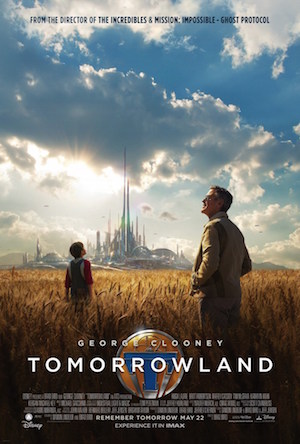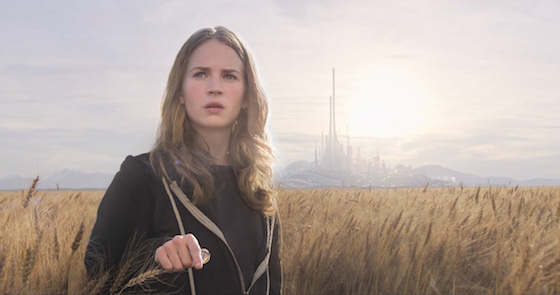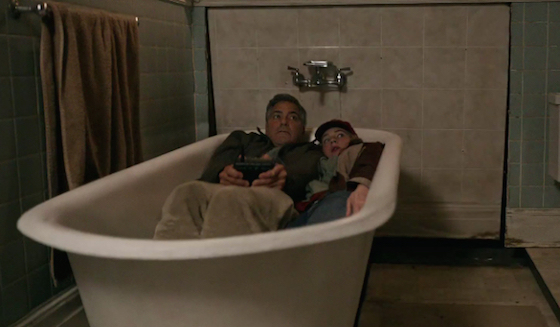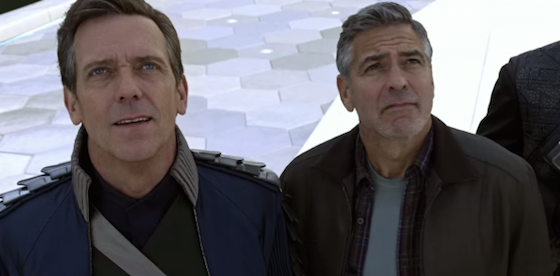What is it with Pixar directors and their live-action dream projects? In 2012, Andrew Stanton wrote and directed John Carter, a giant, sprawling mess of a movie that failed at the box office and quickly faded into obscurity, taking Taylor Kitsch‘s blockbuster status with it.
Now brilliant writer/director Brad Bird brings us Tomorrowland, a giant, sprawling mess of a movie with some great, big ideas and some great, big problems.
Britt Robertson plays Casey, a brilliant optimist in a world inundated with pessimists and cynics. She has big dreams of the stars and interstellar travel and moonlights as a saboteur of the deconstruction efforts around the space program at Cape Canaveral. One day she gets caught and when she posts bail discovers a magical pin among her belongings that give her a glimpse of Tomorrowland, this incredible place full of scientific wonder and the promise of a brighter tomorrow. She eventually encounters Athena, a strange young girl with some serious kung fu skills, played by Raffey Cassidy and the two of them are off in search of Frank Walker, an inventor/boy genius played by George Clooney, and a way into Tomorrowland.
Tomorrowland has a few things in its favor, chief of which are Robertson and Cassidy who both deliver outstanding performances, even if they couldn’t be more different. Robertson’s Casey could and would be an extremely cookie-cutter archetype of the spunky explorer in a less actress’ hands, where words like “plucky” get thrown around with reckless abandon. Instead, she’s thoughtful and confident. The character’s signature optimism is never overused or relied upon singularly to define her character.
Some of the movie’s best scenes come between Robertson’s Casey and the character’s dad, played by Tim McGraw. Bird is an expert at characterization by omission – leaving details out of a scene and letting the audience fill in the blanks, and he does that a few times in Tomorrowland to good effect.
Cassidy’s Athena is compelling in her own right because of how inhuman she’s able to make her character, a more difficult feat than it may initially seem. Cassidy holds her own against heavyweights like Clooney and Hugh Laurie, and many of her scenes are some of the movie’s funniest moments.
It’s unfortunate that the movie that surrounds these performances is so narratively weak and underdeveloped. Tomorrowland has a lot of ideas in it, but only a few are explored and none of them are fully developed. The movie starts slow with about 30 to 45 minutes of exposition before it ever even reaches something resembling a rising action or a character objective. There are far-flung moments that seem totally out of place, such as an extended scene in Paris, and the stakes of the entire movie are zero, because the entire story is told as a flashback, something I want to attribute to co-writer Damon Lindeloff, but that’s probably just me still bitter about Lost.
Regardless of who thought of it, there’s no worse way to deflate tensions and lower expectations that to build a chase movie as a flashback, but that’s not even the movie’s biggest narrative offense. Toward the end of the film, a character essentially explains the entire plot and offers a monologue on the state of art and entertainment as a whole. His motivations are dropped and he essentially becomes a mouthpiece for the creative people who wrote and directed Tomorrowland. It is a process I like to call “Sorkin-ing” and Tomorrowland does it hard.
The film’s optimistic ending strikes a hopeful chord. It’s just too bad the movie that preceded was so focused on chase scenes and lecturing the audience.








Comments on this entry are closed.